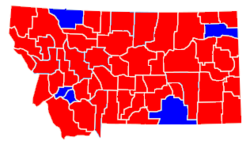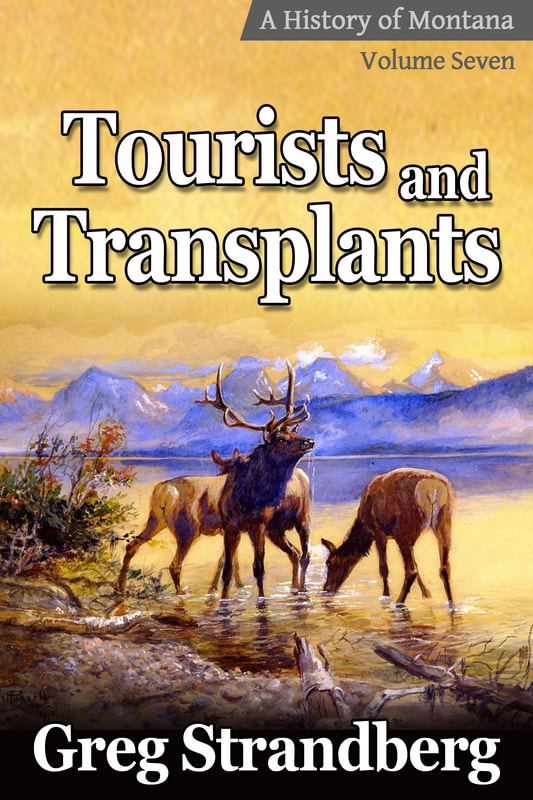 Election 2000
Election 2000
Indeed, the fall benefited them, or at least those that were able to cement their vision into the party apparatus.
This vision departed from an age-old Montana Democratic principle. It’s called conservatism. I feel our current crop of Montana Democrats have forgotten what this is, and Republicans have benefited.
A lot of it comes down to the lack of jobs and the population shifts this causes.
Neighboring states have fared better than Montana over the past few decades, even as their resource extraction economies disappeared just as ours did.
Like Montana, the neighboring states of Nebraska, Colorado, and Washington have seen agriculture modernize, reducing the need for rural residents.
“The difference,” University of Montana historian David Emmons writes, “is that migration out of their rural areas does not mean migration out of the state.”
Those states have industry and business and that can quell that flow from the rural to the cities out of state. “There are no cities in Montana large enough or economically diversified enough to absorb the state’s exiles.”
That should come as no surprise, as Emmons was a University of Montana historian from 1967 to 2004, a period of 37 years. Alas, during that time he only managed three books.
He tells us that Montanan’s identities have been shorn from them with these economic changes. People are what they do for a living, and when their job ends, so do they, in many different ways. “The principle defining elements of Montana,” Emmons writes, “are disappearing, victims of the postindustrial blues.”
Here’s what Emmons says of the political changes this brought about:
“Montana’s political progressives – still Democrats – are now to be found almost exclusively among deep thinkers in urban areas of the western half of the state. The Constitution of 1972, for example, passed despite the fact that forty-four counties voted against it. Of the twelve counties that support it, all were urban and nine were in the western district. The agenda of these new-style Democrats is different from the old; indeed many of the latter, including Marc Racicot, the present Republican governor, left the party – or were abandoned and left politically homeless by its new leaders.”
“New Democrats favor postindustrial issues such as environmentalism and multiculturalism. Their tactics are different; they are more tendentious and confrontational. They are also more meticulous in their record keeping and much less likely to get out the cemetery vote. The old Democrats, however, sent James Murray, Mike Mansfield, and Lee Metcalf to the Senate. The new ones have yet to do so well.”
We see this a lot in the state, and it’s only grown over the past two decades. “As some of the larger farms and ranches come to resemble country clubs, this dividing line becomes fuzzy.”
A lot of it comes down to conservative principles. There was a time when Montana “could afford six university units, fifty-six counties, more school districts than California, a worker’s compensation law that was both solvent and compensatory.”
Emmons was of course writing at a time when the state had $225 million in debt and a bankrupt worker’s comp fund.
That’s the thing with Republicans – they always leave government in a terrible state, with the treasury empty and the people worse off. This is a drawback of them always trying to benefit themselves at the expense of everyone else.
In Montana, politics was “both cause and effect of communal values. Politics formed communities and was formed by them.” This goes away “as some of the state’s towns deteriorate,” for “this communal function loses both its power to create and the source of its creation.”
You see this in Missoula, with too many Democrats for the available seats. You see this in rural areas, with not enough Democrats to even field a candidate at times.
Will the legislature be Democratic in another decade or two? By that time our rural areas should have fallen off further, something that only benefits Democrats.
Since the Democrats have no other plan to win over voters besides this, it’s fair to say they’ll stick to their current positions and wait.
Will that be enough for them to keep the governor’s office in 2016? It’s hard to say, but it’s pretty clear the legislature will be lost to them again.
Unless Republicans can figure out how to gain a firmer toehold in the urban areas, or decrease the mass exodus from the rural areas, this won’t always be the case.
And that’s why we have the current intransigence of the Montana Democratic Party when it comes to listening to alienated and dispossessed voters.
They know they can do nothing, for waiting will eventually bring them the win. It might not taste like a win, but to the upper crust at the top, does it matter?

